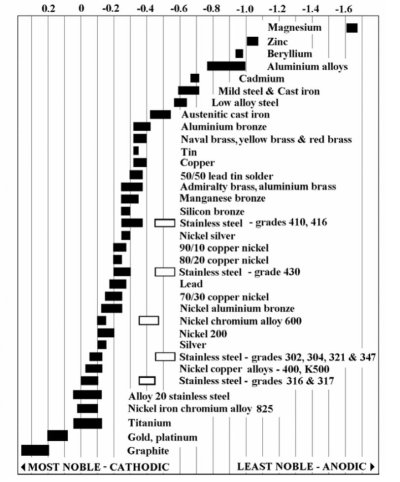RO permeate has a relatively low pH and drops about 1 point from the feedwater pH. Average seawater is around 7.2 so permeate will be around 6.2. RO permeate has little to no alkalinity or hardness. Combined with dissolved oxygen this makes the permeate unstable and aggressive. Water wants to balance and become stable so it will leach metals from any source it finds to do so. That means any metal pipe, pumps, hot water heaters especially, washing machine, dish washer, etc. will be slowly corroded over time.
The Langlier Saturation Index (LSI) is a quick reference method for determining water corrosivity. A negative LSI is corrosive while a positive LSI is plating, meaning constituents in the water are coming out of solution and coating the metal surfaces stopping corrosion. Average SWRO has an LSI of around -1.2 which is very corrosive. On larger land based facilities we use Zinc Orthophospahte as one of the chemicals to reduce corrosion. The Zinc falls out of solution and plates the metal components with a zinc layer protecting it. To get SWRO permeate positive is a very difficult and constantly changing effort requiring at least 3 different post treatment chemicals, constant monitoring and adjustment. As feedwater chemistry changes with tide and rainfall so does the permeate and requirement for chemical adjustment.
I wrote a detailed paper on this subject back in the 90's. Ill try to find it and post. Sorry for the length but you asked...


